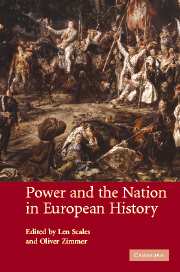Book contents
- Frontmatter
- Contents
- List of contributors
- Introduction
- PART I APPROACHES AND DEBATES
- PART II THE MIDDLE AGES
- PART III ROUTES TO MODERNITY
- PART IV MODERNITY
- 12 Enemies of the Nation? Nobles, foreigners and the constitution of national citizenship in the French Revolution
- 13 Nation, nations and power in Italy, c. 1700–1915
- 14 Political institutions and nationhood in Germany, 1750–1914
- 15 Nation, nationalism and power in Switzerland, c. 1760–1900
- 16 Nation and power in the liberal state: Britain c. 1800–c. 1914
- Index
15 - Nation, nationalism and power in Switzerland, c. 1760–1900
Published online by Cambridge University Press: 02 December 2009
- Frontmatter
- Contents
- List of contributors
- Introduction
- PART I APPROACHES AND DEBATES
- PART II THE MIDDLE AGES
- PART III ROUTES TO MODERNITY
- PART IV MODERNITY
- 12 Enemies of the Nation? Nobles, foreigners and the constitution of national citizenship in the French Revolution
- 13 Nation, nations and power in Italy, c. 1700–1915
- 14 Political institutions and nationhood in Germany, 1750–1914
- 15 Nation, nationalism and power in Switzerland, c. 1760–1900
- 16 Nation and power in the liberal state: Britain c. 1800–c. 1914
- Index
Summary
In the autumn of 1798, the Minister of the Interior of the short-lived Helvetic Republic lamented that the state of Swiss patriotism left much to be desired. His opinion was echoed in a report he received from the governor of Bern in October of the same year: ‘I find no common spirit; the conceptions which exist among our people are too numerous, too inadequate and too vague.’ Nearly a century later, the author of an essay on the history of Switzerland's national festivals painted a much more positive picture. In the fifty years since the foundation of the Swiss nation-state in 1848 the Swiss, so he reasoned, had ‘become a people’.
On the face of it, these observations seem to confirm what can safely pass as common scholarly wisdom: that the long nineteenth century represents the classic era of nation-formation, a process that strengthened national identity among many of Europe's populations. Yet historians are trained to be sceptical of statements like the ones just cited. Shaped as they are by the perceptions, motivations and ambitions of their producers, they ought not to be taken naively at face value. Thus, if the minister of the Helvetic Republic came to a gloomy assessment of the state of Swiss patriotism, then this may in part reflect the high expectations so typical of members of the new republican ruling class. It also reveals their tendency to equate opposition to the Helvetic regime with disloyalty to ‘the nation’.
- Type
- Chapter
- Information
- Power and the Nation in European History , pp. 333 - 353Publisher: Cambridge University PressPrint publication year: 2005

